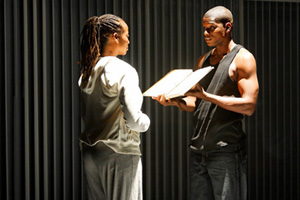
Paulanne Simmons
"Snapshots" Needs a Better Focus
"Snapshots"
Directed by Gregory Simmons
Presented by Diverse City Theater Co.
The Beckett Theatre at Theatre Row
410 West 42nd St. between 9th and 10th avenues
Opened Aug. 16, 2007
Thurs. thru Sat. Aug 16-18 8 p.m., Aug. 18 2 pm., Mon. thru Sat. Aug.
20-Sept 1 8 p.m.
$18 (212) 279-4200 or www.ticketcentral.com
Closes Sept. 1, 2007
Reviewed by Paulanne Simmons Aug. 21, 2007.
 |
| Actors in "Snapshots." Photo by Carlos Damocles. |
The women in Diverse City Theater Company's evening of one-acts, "Snapshots," are in their 50s, 60s and 70s. In other words they're of an age when our society is not much interested in them. The company, and Gregory Simmons, who directs all three plays, are certainly to be commended for venturing where so many others would not care to go. One can only wish they had found plays that were more penetrating and were structurally something more than conversations between two people.
Under the rules of full disclosure, let me say that I first heard a reading of "Colleen Ireland" by Stuart Harris at an Ensemble Studio Theatre summer workshop several years ago. At the time, my opinion was the same as it is now. The piece is beautifully written and often engaging, but an extended conversation about who gets the car keys, Colleen (Shirley Bodtke) or her 97-year-old, accident-prone grandmother (Larisa Polonsky), does not exactly make for high drama.
True, Harris adds a subplot concerning Colleen's no-good boyfriend who wants her to remain committed while he plays the field, and Grandmother has lots of amusing observations on life, which Polonsky delivers beautifully. But this doesn't make up for the predictable and too-easy ending.
Linda Faigao-Hall's "The A-Word" puts onstage two young people, Beth (Melanie Nicholls King) and David (Antwan Ward) and leaves the audience wondering through the first two-thirds of the play what they're talking about and what their relationship to each other is.
Unlike "Colleen Ireland," this one-act is not improved by humor or impressive acting. The poor acting, however, may have been a result of the director's attempt to keep the play ambiguous. If so, it was a mistake.
By the end of "The A-Word" the secret is out, and we know what the mystery is all about, but for the sake of preserving some interest, I won't say what that is. Suffice it to mention that the best line of the play is David's: "All babies are sweet and innocent. If they came out talking, no one would want them."
In Lydia Stryk's "The End of Civilization as We Know It," two aging lesbians, Edith (Maxine Prescott) and Bea (Meg Myles), talk about their fifty-year relationship, seated on either side of a flower arrangement at their grandson's wedding. Both Prescott and Myles are effective and believable, but the dialogue is too clever by far and never allows us to feel their pain and frustration
The play hinges on the irony that these two women have never been able to marry each other, both settling for men they didn't love. As worthy as the cause may be, it's a pretty squeaky hinge to hang a play on.
"The End of Civilization as We Know It" ends with the two women kissing passionately. This might have been a shocking ending twenty years ago. But today it didn't cause so much as a stir in the audience.
It's hard to choose between no plays about mature women beyond the first blush of youth and plays that glide lightly over real issues and problems. Perhaps the best advice for Diverse City Theater Company is that they should demand more from playwrights so that the actors and director can work with material worthy of their talents.

| lobby | search
| home | cue-to-cue |
discounts | welcome | film
| dance | reviews |
| museums | NYTW
mail | recordings | coupons |
publications | classified |